|
ISLAM
What others said about Islam
Those who listen to the word and follow the best of it; those are the
ones whom God has guided, and those are the ones endowed with
understanding (Holy Qur'an 39:18).
This is a collection of short quotations from a wide variety of
Non-Muslim notables, including academics, writers, philosophers, poets,
politicians, and activists belonging to the East and the West. To our
knowledge none of them ever became Muslim. These words, therefore,
reflect their personal views on various aspects of the religion of
Islam.
Bertrand Russell
|
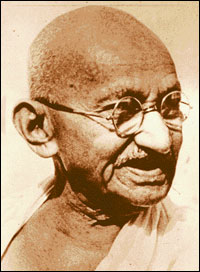
Mahatma Gandhi |
Bertrand Russell (1872-1970) British philosopher, mathematician, and
Nobel laureate, whose emphasis on logical analysis greatly influenced
the course of 20th-century philosophy.
"Our use of the phrase 'the Dark Ages' to cover the period from 699
to 1,000 marks our undue concentration on Western Europe... From India
to Spain, the brilliant civilization of Islam flourished.
What was lost to Christendom at this time was not lost to
civilization, but quite the contrary... To us it seems that
West-European civilization is civilization; but this is a narrow view."
(History of Western Philosophy, London, 1948, p. 419)
Mahatma Gandhi
I wanted to know the best of the life of one who holds today an
undisputed sway over the hearts of millions of mankind.... I became more
than ever convinced that it was not the sword that won a place for Islam
in those days in the scheme of life.
It was the rigid simplicity, the utter self-effacement of the Prophet
the scrupulous regard for pledges, his intense devotion to his friends
and followers, his intrepidity, his fearlessness, his absolute trust in
God and in his own mission. These and not the sword carried everything
before them and surmounted every obstacle. When I closed the second
volume (of the Prophet's biography), I was sorry there was not more for
me to read of that great life
James A. Michener
James A. Michener (1907-1997) Leading American writer; recipient of
honorary doctorates in five fields from thirty leading universities and
decorated with the Presidential Medal of freedom, America's highest
civilian award.
"No other religion in history spread so rapidly as Islam . . . The
West has widely believed that this surge of religion was made possible
by the sword. But no modern scholar accepts that idea, and the Qur'an is
explicit in support of the freedom of conscience." (Islam - The
Misunderstood Religion, Readers' Digest (American Edition) May 1955)
Edward Gibbon
Edward Gibbon (1737-1794). Considered the greatest British historian
of his time.
"'I believe in One God and Mohammed the Apostle of God,' is the
simple and invariable profession of Islam.
The intellectual image of the Deity has never been degraded by any
visible idol; the honours of the prophet have never transgressed the
measure of human virtue, and his living precepts have restrained the
gratitude of his disciples within the bounds of reason and
religion."(History Of The Saracen Empire, London, 1870, p. 54.)
"More pure than the system of Zoroaster, more liberal than the law of
Moses, the religion of Mahomet might seem less inconsistent with reason
than the creed of mystery and superstition which, in the seventh
century, disgraced the simplicity of the gospels." (The History of the
Decline and Fall of the Roman Empire, vol. 5. p. 487)
|
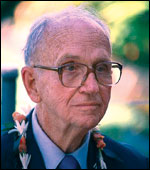
James A Michener |
Annie Besant
Annie Besant (1847-1933) British theosophistand nationalist leader in
India. President of the Indian National Congress in 1917.
"I often think that woman is more free in Islam than in Christianity.
Woman is more protected by Islam than by the faith which preaches
Monogamy. In Al-Quran the law about woman is more just and liberal. It
is only in the last twenty years that Christian England, has recognized
the right of woman to property, while Islam has allowed this right from
all times." (The Life and Teachings of Muhammad, Madras, 1932, pp. 25,
26)
Sarojini Naidu
|

Bertrand Russell |
Sarojini Naidu (1879-1949) A writer, poetess and one of the most
visible leaders of pre-Independent India. President of the Indian
National Congress and the first woman governor of free India.
"Sense of justice is one of the most wonderful ideals of Islam,
because as I read in the Qur'an I find those dynamic principles of life,
not mystic but practical ethics for the daily conduct of life suited to
the whole world."
"It was the first religion that preached and practiced democracy for,
in the mosque when the call for prayer is sounded and worshippers are
gathered together, the democracy of Islam is embodied five times a day
when the peasant and king kneel side by side and proclaim: "God Alone is
Great." I have been struck over and over again by this indivisible unity
of Islam that makes man instinctively a brother." (Lectures on "The
Ideals of Islam;" see Speeches And Writings Of Sarojini Naidu, Madras,
1918, pp. 167-9)
Arnold J. Toynbee
Arnold J. Toynbee (1889-1975) British historian, Lecturer at Oxford
University.
|
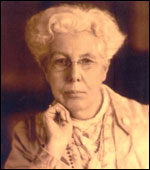
Annie Besant |
"The extinction of race consciousness as between Muslims is one of
the outstanding achievements of Islam, and in the contemporary world
there is, as it happens, a crying need for the propagation of this
Islamic virtue." (Civilization On Trial, New York, 1948, p. 205)
William Montgomery
Watt William Montgomery Watt (1909- ) Professor (Emeritus) of Arabic
and Islamic Studies at the University of Edinburgh. "I am not a Muslim
in the usual sense, though I hope I am a "Muslim" as "one surrendered to
God," but I believe that embedded in the Qur'an and other expressions of
the Islamic vision are vast stores of divine truth from which I and
other occidentals have still much to learn, and Islam is certainly a
strong contender for the supplying of the basic framework of the one
religion of the future.'"
(Islam And Christianity Today,
London, 1983, p. ix)
Ottoman Empire and the faith
The Ottoman Empire was a sprawling political and military entity that
arose in the late Middle Ages and survived into the 20th Century. The
achievements of the Ottoman Empire include excellence in art and
culture, autocratic brilliance and a large handful of initial military
victories, and eventual defeats toward the end of its reign.
The following century saw the rise of the most famous ruler of the
Ottoman Empire, Suleyman the Magnificent. His long reign was punctuated
by a series of brilliant victories giving the Ottoman Empire control of
much of Egypt and much of the Balkans territory, including
Bosnia-Herzegovina, Bulgaria, Hungary, Moldava, Montenegro, Romania, and
Serbia. It was Suleyman who installed a justice system that lasted until
the fall of the empire. It was also during his reign that the great
Ottoman tradition of beautiful art, architecture, and literature began
its ascent. Suleyman renamed Constantinople as Istanbul and had some of
the world's most breathtaking buildings and paintings created.
Origins
|
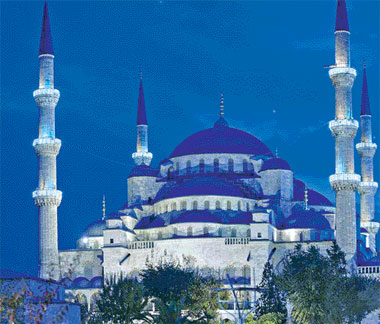
Selimiye Mosque was the masterpiece of Mimar Sinan |
The Ottoman state began as one of many small Turkish states that
emerged in Asia Minor during the breakdown of the empire of the Seljuk
Turks. The Ottoman Turks began to absorb the other states, and during
the reign (1451-81) of Muhammad II they ended all other local Turkish
dynasties. The early phase of Ottoman expansion took place under Osman
I, Orkhan, Murad I, and Beyazid I at the expense of the Byzantine
Empire, Bulgaria, and Serbia. Bursa fell in 1326 and Adrianople (the
modern Edirne) in 1361; each in turn became the capital of the empire.
The great Ottoman victories of Kosovo Field (1389) and Nikopol (1396)
placed large parts of the Balkan Peninsula under Ottoman rule and
awakened Europe to the Ottoman danger. The Ottoman siege of
Constantinople was lifted at the appearance of Timur, who defeated and
captured Beyazid in 1402. The Ottomans, however, soon rallied.
Period of great expansion
The empire, reunited by Muhammad I, expanded victoriously under
Muhammad's successors Murad II and Muhammad II. The victory (1444) at
Varna over an army led by Ladislaus III of Poland was followed in 1453
by the capture of Constantinople. Within a century the Ottomans had
changed from a nomadic horde to the heirs of the most ancient surviving
empire of Europe. Their success was due partly to the weakness and
disunity of their adversaries, partly to their excellent and far
superior military organization. Their army comprised numerous
Christians-not only conscripts, who were organized as the corps of
Janissaries, but also volunteers.
Turkish expansion reached its peak in the 16th century. under Selim I
and Sulayman I (Sulayman the Magnificent).
The Hungarian defeat (1526) at Moh cs prepared the way for the
capture (1541) of Buda and the absorption of the major part of Hungary
by the Ottoman Empire; Transylvania became a tributary principality, as
did Walachia and Moldavia. The Asian borders of the empire were pushed
deep into Persia and Arabia. Selim I defeated the Mamluks of Egypt and
Syria, took Cairo in 1517, and assumed the succession to the caliphate.
Algiers was taken in 1518, and Mediterranean commerce was threatened by
corsairs, such as Barbarossa, who sailed under Turkish auspices.
Most of the Venetian and other Latin possessions in Greece also fell
to the sultans. During the reign of Sulayman I began (1535) the
traditional friendship between France and Turkey, directed against
Hapsburg Austria and Spain. Sulayman reorganized the Turkish judicial
system, and his reign saw the flowering of Turkish literature, art, and
architecture. In practice the prerogatives of the sultan were limited by
the spirit of Muslim canonical law (sharia), and he usually shared his
authority with the chief preserver (sheyhlislam) of the sharia and with
the grand vizier (chief executive officer).
In the progressive decay that followed Sulayman's death, the clergy (ulema)
and the Janissaries gained power and exercised a profound, corrupting
influence. The first serious blow by Europe to the empire was the naval
defeat of Lepanto (1571; see Lepanto, battle of), inflicted on the fleet
of Selim II by the Spanish and Venetians under John of Austria.
However, Murad IV in the 17th century. temporarily restored Turkish
military prestige by his victory (1638) over Persia. Crete was conquered
from Venice, and in 1683 a huge Turkish army under Grand Vizier Kara
Mustafa surrounded Vienna. The relief of Vienna by John III of Poland
and the subsequent campaigns of Charles V of Lorraine, Louis of Baden,
and Eugene of Savoy ended in negotiations in 1699 (see Karlowitz, Treaty
of), which cost Turkey Hungary and other territories.
Collapse
In 1908 the Young Turk movement, a reformist and strongly nationalist
group, with many adherents in the army, forced the restoration of the
constitution of 1876, and in 1909 the parliament deposed the sultan and
put Muhammad V on the throne. In the two successive Balkan Wars
(1912-13), Turkey lost nearly its entire territory in Europe to
Bulgaria, Serbia, Greece, and newly independent Albania.
The outbreak of World War I found Turkey lined up with the Central
Powers. Although Turkish troops succeeded against the Allies in the
Gallipoli campaign (1915), Arabia rose against Turkish rule, and British
forces occupied (1917) Baghdad and Jerusalem.
In 1918, Turkish resistance collapsed in Asia and Europe. An
armistice was concluded in October, and the Ottoman Empire came to an
end.
Courtesy: Encyclopaedia-Ottoman
empire
Sacred Conversation
Yasmin Mogahed
There is a time of night when the whole world transforms. During the
day, chaos often takes over our lives. The responsibilities of work,
school and family dominate much of our attention. Other than the time we
take for the five daily prayers, it is hard to also take time out to
reflect or even relax. Many of us live our lives at such a fast pace, we
may not even realize what we're missing.
But there is a time of night when work ends, traffic sleeps and
silence is the only sound. At that time-while the world around us
sleeps-there is One who remains awake and waits for us to call on Him.
|
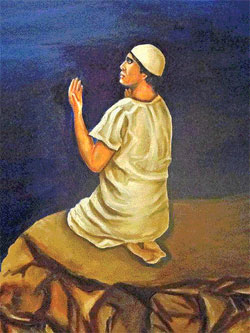
The Lord waits for us to come speak with Him |
We are told i: "Our Lord descends during the last third of each night
to the lower heaven, and says: 'Is there anyone who calls on Me that I
may respond to him? Is there anyone who asks Me that I may give unto
him? Is there anyone who requests My Forgiveness that I may forgive
him?'" (Bukhari and Muslim).
One can only imagine what would happen if a king were to come to our
door, offering to give us anything we want. One would think that any
sane person would at least set their alarm for such a meeting. If we
were told that at exactly one hour before dawn a check for $10,000,000
would be left at our doorstep, would we not wake up to take it?
Allah (exalted is He) has told us that at this time of night, just
before dawn, He will come to His servants. Imagine this.
The Lord of the universe has offered us a sacred conversation with
Him. That Lord waits for us to come speak with Him, and yet many of us
leave Him waiting while we sleep in our beds. Allah (swt) comes to us
and asks what we want from Him. The Creator of all things has told us
that He will give us whatever we ask.
And yet we sleep
There will come a day when this veil of deception will be lifted. The
Qur'an says: "[It will be said], You were certainly in unmindfulness of
this, and We have removed from you your cover, so your sight, this Day,
is sharp." (Qur'an 50:22).
On that Day, we will see the true reality. On that Day, we will
realize that two rak`at (units) of prayer were greater than everything
in the heavens and the earth. We will realize the priceless check that
was left on our doorstep every night as we slept.
There will come a day when we would give-up everything under the sky
just to comeback and pray those two rak`at.
There will come a day when we would give up everything we ever loved
in this life, everything that preoccupied our hearts and minds, every
mirage we ran after, just to have that conversation with Allah. But on
that Day, there will be some from whom Allah (swt) will turn away... and
forget, as they had once forgotten Him.
The Qur'an says: "He will say, 'My Lord, why have you raised me blind
while I was [once] seeing?' [Allah] will say, 'Thus did Our signs come
to you, and you forgot them; and thus will you this Day be forgotten.'"
(Qur'an, 20:125-126) In Surat al-Mu'minoon, Allah says: "Do not cry out
today. Indeed, by Us you will not be helped." (Qur'an, 23:65)
Can you imagine for a moment what these ayat (verses) are saying?
This is not about being forgotten by an old friend or classmate.
This is about being forgotten by the Lord of the worlds. Not
hellfire. Not boiling water. Not scalded skin. There is no punishment
greater than this.
And as there is no punishment greater than this, there is no reward
greater than what the Prophet (PBUH) describes in the following hadith:
"When those deserving of Paradise would enter Paradise, the Blessed
and the Exalted would ask: Do you wish Me to give you anything more?
They would say: Hast Thou not brightened our faces? Hast Thou not made
us enter Paradise and saved us from Fire? He would lift the veil, and of
things given to them nothing would be dearer to them than the sight of
their Lord, the Mighty and the Glorious." [Sahih Muslim]
But one does not need to wait until that Day to know the result of
this night-time meeting with Allah (swt).
The truth is, there are no words to describe the overwhelming peace
in this life from such a conversation. One can only experience it to
know.
Its effect on one's life is immeasurable. When you experience qiyam,
the late night prayer the rest of your life transforms.
Suddenly, the burdens that once crushed you become light.
The problems that were irresolvable become solved. And that closeness
to your Creator, which was once unreachable, becomes your only lifeline. |



